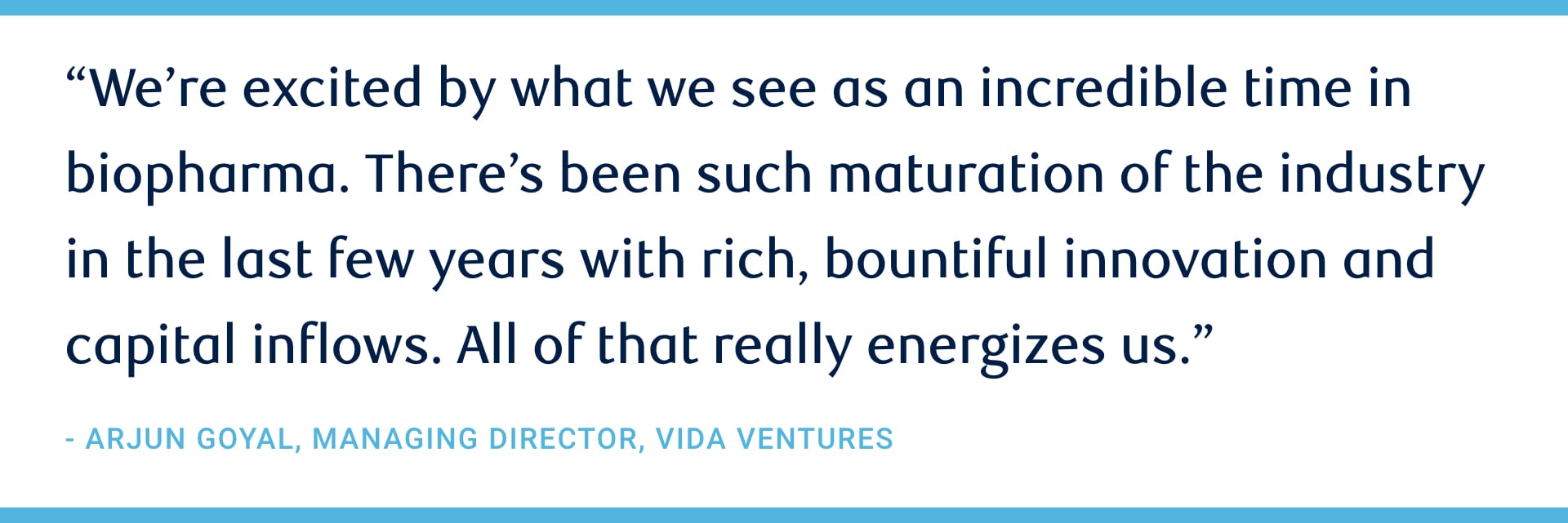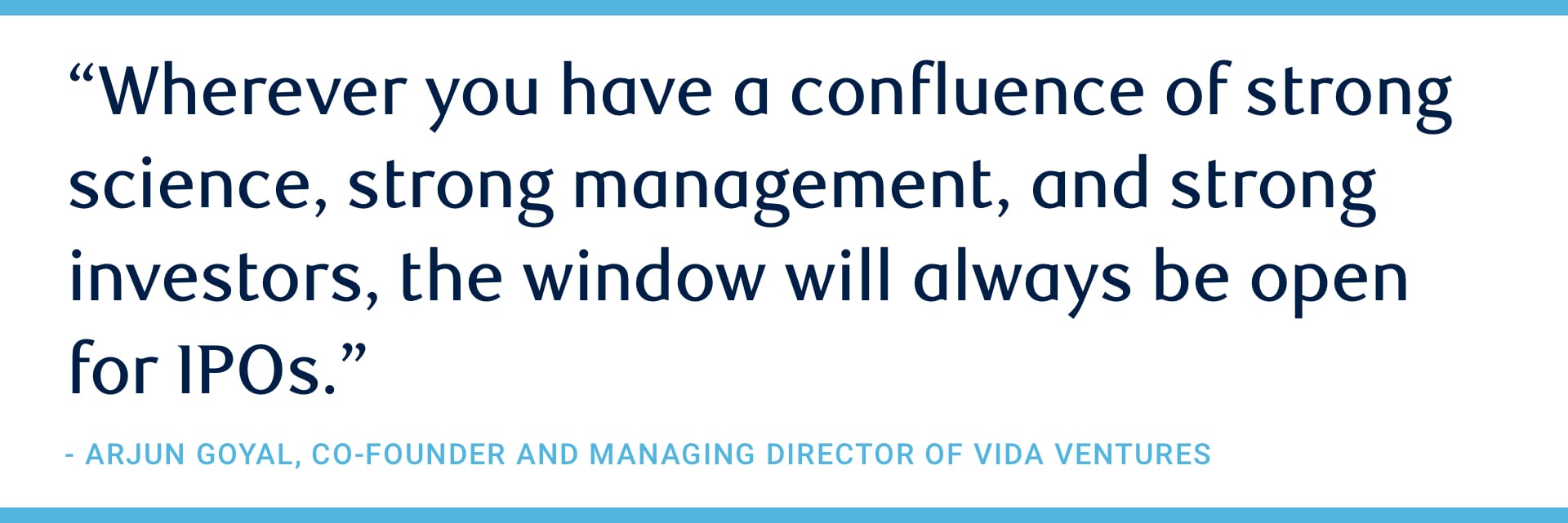
Vida Ventures: Powering Breakthroughs in Biopharma
By RBC Capital Markets
With Arjun Goyal, Co-Founder and Managing Director of Vida Ventures
Key Points
- Vida Ventures is at the forefront of investing in biotech innovation, and they are focused on key modalities like gene therapy, oncology and rare diseases.
- A major investment opportunity in oncology is the trend from autologous to allogeneic therapies that can be batch processed, stored in a fridge and rapidly given to patients.
- The next generation of companies that can deliver new gene therapy formats that will be safer, less toxic, and easier to manufacture.
- Pharma continues to access innovation through M&A and the IPO window will always be open for strong science, management, and investors.
In an exclusive interview on RBC Capital Markets’ new Pathfinders podcast series, Luca Issi, Senior Biotech Analyst at RBC Capital Markets, speaks with Arjun Goyal, Co-Founder and Managing Director of Vida Ventures, a next generation life sciences venture capital firm.
Find out why Arjun is passionate about investing in real innovation and the purpose behind Vida Ventures, as well as Arjun’s take on emerging modalities and investor trends in today’s unique market.
Listen to the full interview on Pathfinders, a new podcast from RBC for companies and investors in biopharma. Start listening now.
Luca Issi
What is the big picture mission of Vida Ventures? What is it that makes the firm tick?
Arjun Goyal
I think there are several key things that energize us at Vida. Firstly, it’s working with entrepreneurs, scientists, and investors to develop the next generation of impactful curative medicines. That’s core to our thesis. Many of us at Vida come from backgrounds as physicians or scientists, so we’re passionate about the new curative modalities that are appearing.
Secondly, we like to work with entrepreneurs to help them be creative about putting their companies and pipelines together, and to help them access private and public capital to fuel their growth.
Finally, we’re excited by what we see as an incredible time in biopharma. There’s been such maturation of the industry in the last few years with rich, bountiful innovation and capital inflows. All of that really energizes us.
LI
What’s the secret to finding transformative technologies in those deep pockets of science where others only see risk?
AG
I think of it like this. Risk in biotech is like beauty. It’s in the eye of the beholder. Where many people see risks, we see opportunities.
There are several reasons why. The first is our background as physician-scientists. We know the rules of the game. That gives us comfort that we can de-risk the science.
The second is our focus on key modalities like gene therapy, oncology and rare diseases, so that we know those areas intimately as researchers, as entrepreneurs, and as investors.
The third is that we work with syndicate partners who are equally, if not more, savvy about these spaces, so we’re always looking at how we can leverage their insights, their talents, and their capital.
LI
You mentioned your focus on oncology. What do you think are the current limitations of cell therapies?
AG
For me, the fundamental limitations in cell therapy and oncology are around accessibility and manufacturing. First-generation therapies have been autologous treatments that are difficult to access and very expensive.
So, a major opportunity we have as investors is the trend from autologous to allogeneic therapies that can be batch processed, stored in a fridge and rapidly given to patients.
Cell therapies have shown tremendous clinical benefits in blood and liquid tumors. But when it comes to oncology, only about 10% of tumors are liquid tumors – the other 90% are solid tumors that have been insensitive to cell therapy.
Figuring out how we use cell therapy in solid tumors is another major opportunity for us. That’s a paradigm shift.
LI
Pivoting to target therapies, there are some perceptions that old school small molecule medicinal chemistry is dead. Can you talk about that and the rationale behind your investments in Kinnate and Kronos Bio?
AG
I do believe that was a first-generation approach where you had non-selective chemistry going after validated targets. The new generation is leveraging new tools, many of which are computational, to get to an endpoint where you’re going after the so-called undruggable targets that we know to be relevant to cancer.
We’ve never had the capabilities to go after them selectively before. Now we have the tools, whether it’s degraders as a chemistry modality, whether it’s using various computational techniques, AI, data sciences or protein motion visualization.
That’s what’s driving the interest we’ve seen in some of our portfolio companies like Peloton Therapeutics, going after HIP2 alpha selectively, or in Kronos Bio, which is going off to various transcription factors, or in Kinnate, which is going after those specific resistant mutants.
What is the cycle of technological innovation in biopharma? Find out more on RBC’s Pathfinders in Biopharma podcast series. Start listening now.
LI
We’ve recently seen how manufacturing continues to be a key area of focus in gene therapy, and we’ve seen the FDA being directionally more stringent in that area. Is that changing your philosophy in terms of investing?
AG
I think any type of technology innovation follows a predictable cycle. Firstly, there’s the promise of the technology in academia. Then there’s the clinical breakthrough. Then you have industry swarming in to industrialize the process. Then the kinks in the armor become apparent.
With gene therapy, we’re at a stage where the kinks are apparent. The promise is still there, and we’re very bullish on this space because we have the toolkit to figure those issues out.
We already see the next generation of companies that can deliver new gene therapy formats that will be safer, less toxic, and easier to manufacture. That field is just in its infancy.
LI
When you look at the latest innovations that are coming next, what do you think the biggest biotech breakthrough for the next decade will be?
AG
For me, it’s gene editing as a tool to enable a generation of therapies that can cure diseases like sickle cell diseases and hemophilia. The modality of gene editing is exciting, but from a clinical perspective, we’re in an exciting new era of curative therapies. We have a suite of technologies that can address the root cause of genetic diseases. And we’re going to see some outstanding clinical results through that in the coming decade.
LI
It’s been a record-breaking year for biopharma IPOs. What are your thoughts on companies flipping public sooner rather than later? And how are you thinking about exit opportunities?
AG
With IPOs, I would say that our industry has benefited from very open public markets here in the U.S. that are very receptive to innovation. Wherever you have a confluence of strong science, strong management, and strong investors, the window will always be open for IPOs.
In terms of exits, I’d say Vida is actually a very M&A driven firm. Pharma M&A is the lifeblood of this industry. Pharma continues to access innovation through M&A. Their early-stage pipeline is coming from venture-backed biotech companies. New FDA-approved medicines, particularly in areas like cell therapy and gene therapy, are coming from venture-backed biotech companies.
Gain perspective to help you lead today and define tomorrow with Pathfinders, a new podcast from RBC for companies and investors in biopharma. Learn more.


